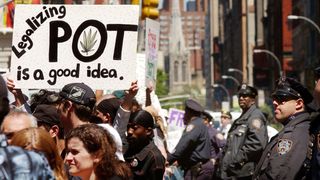In the United States and Australia, the possession, distribution and use of illicit drugs is on the rise, despite prosecution. One solution is drug decriminalisation – the elimination of criminal punishment for drug use. When enacted elsewhere, drug decriminalisation has reduced arrests and the number of incarcerated individuals, prioritised health, reduced stigma and encouraged harm reduction and recovery methods.
In 2017, 11.2 per cent of the US population admitted to using illicit drugs within the past month; a full one per cent increase from 2014. In 2016, 15.6 per cent of Australians polled admitted to using illicit drugs within the last year. This represents a 0.6 per cent increase from 2013.
Along with increased rates of drug use comes increased rates of arrests and incarceration.
Drug laws in the United States and Australia
American drug laws depend on factors like the drug type, quantity, the jurisdiction and the specific circumstances of the alleged crime. The punishment for possessing illicit drugs ranges from warnings and fines to imprisonment.
The US ‘War on Drugs’ has been one of the most significant contributors to America’s prison overpopulation crisis. As of 2017, drug possession was the number one cause of arrests in the United States. Nationwide, there are 2.3 million people confined, more than any other nation and by far the most per capita. One in five of these prisoners is locked up for non-violent drug offenses.
Drugs are regulated at both a state and federal level and 14 American states have now decriminalised cannabis, but most other recreational drugs remain illegal.
The Australian drug criminalisation system also prosecutes users on a case-by-case basis. In 2017, Australia recorded a record number of drug seizures and arrests with 16 per cent of all prisoners confined due to illicit drug offenses. Drug punishment in Australia is predominantly handled at a state level rather than a federal one.
With this power, some states have been able to water down drug crime punishments. For example, South Australia, the Australian Capital Territory and the Northern Territory all provide de jure decriminalisation for cannabis, which removes criminal punishment for drug use, within the law. They use de facto decriminalisation for all other illicit drugs, meaning criminal punishment remains within the law but is optionally enforced.
If decriminalisation is enacted in the United States and Australia, evidence suggests destigmatisation would clear the way not only for the safe use of drugs but, importantly, would also provide access to treatments aimed at breaking unwanted addictions.
How does decriminalisation affect drug use?
A number of studies suggest drug decriminalization (especially cannabis) would dramatically reduce the costs and demands of the criminal justice system and lead to improved social outcomes such as increased employment and decreased school drop-out rates, all without increasing drug-use rates. If decriminalisation is enacted in the United States and Australia, evidence suggests destigmatisation would clear the way not only for the safe use of drugs but, importantly, would also provide access to treatments aimed at breaking unwanted addictions.
Drug decriminalisation has been implemented in many forms throughout the world. Portugal is often referenced as a prime example for American and Australian drug reform. Portugal enacted drug decriminalisation policies in 2001 after drug use became rampant and the country saw increased rates of infectious disease such as HIV and Tuberculosis. Portugal opted to decriminalise to prevent a health crisis and total social exclusion.
Eighteen years later, overdose deaths, HIV infections, problematic drug use and drug-related incarceration in Portugal have decreased while voluntary drug treatment rates have increased.
Because drug users now have access to harm-reduction treatments and are able to become sober in a safe and supportive environment, drug-usage rates have also decreased. The Portuguese example highlights the positive outcomes that can result when a country transitions from treating drug use as a criminal justice issue to a public health issue.
The push for decriminalisaiton
With the increase in both drug users and incarceration rates, there is a clear case that drug reform needs to occur.
Major proponents in the United States and Australia expect reform would lower substance abuse rates, positively change the perception of drug users and allow law enforcement to focus on more pertinent and threatening crimes.
The majority of Australians already believe that illicit drugs should be decriminalised, and a treatment or education program should be offered to users of all drugs besides cannabis.
In the United States, drug decriminalisation reform is hardly popular among elected officials but is gaining significant support from the public. A 2014 poll found that 67 per cent of Americans believe the government should focus on providing treatment rather than prosecution for drug use.
With proven benefits and a favourable environment for reform, there is a need to deeply consider decriminalisation as a step towards bettering public health by implementing laws that studies show increase well-being, decrease incarceration and improve a multitude of social outcomes.






